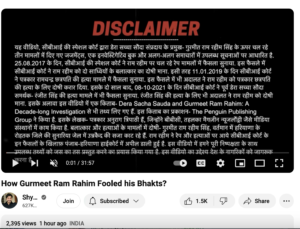The judgement of the Supreme Court granting bail to the AltNews co-founder, Mohammed Zubair, delivered by Justice Dr Dhananjaya Chandrachud on July 22, 2022, reinforced the freedom of expression of journalists, besides affirming the right of citizens to bail and a curb on the the punishing process of being charged in multiple cases across different states, securing bail in these cases and being re-arrested soon after.

The court also disbanded a Special Investigation Team set up by the Uttar Pradesh government and order the transfer of all the six cases lodged against him to the Delhi police special cell. The order said there was no justification for keeping him in continued custody in different police stations when the allegations arose from tweets already being investigated by the Delhi police.
Zubair was arrested by Delhi police on June 27, 2022, on the basis of an FIR lodged in Delhi for a tweet he posted in 2018, of a screenshot of a 1983 Hindi film, that allegedly hurt religious sentiments. The arrest came days after he tweeted about the hate speech by then Bharatiya Janata Party (BJP) spokesperson Nupur Sharma on the television channel Times Now, where she made insulting and derogatory references to the Prophet Mohammed. In the furore that followed, Sharma was suspended by the BJP. Several protests continued and one turned violent. FIRs were lodged against her but she has not been arrested.
Zubair was charged with sections 153 (wantonly giving provocation with intent to cause riot) and 295A (deliberate and malicious acts intended to outrage religious feelings of any class by insulting its religion or religious beliefs) of the Indian Penal Code (IPC). Subsequently, he was charged for violating sections of the Foreign Contribution Regulation Act (FCRA), 2010.
More complaints were lodged against him and ultimately, he faced six more FIRs, two in Hathras, one each in Lakhimpur Kheri, Muzaffarnagar, Ghaziabad and Sitapur. On July 8, 2022, a vacation bench of Justices Indira Banerjee and JK Maheshwari granted him bail. His advocate, Colin Gonsalves, said there will be nothing left in this country for seekers of truth and secularism if journalists who expose hatemongers are arrested but the real hatemongers are out on bail! A day later, UP police sought his custody in another case in Lakhimpur Kheri .
Arguing his bail application before the Supreme Court, Adv Vrinda Grover asked “Who is actually inciting? The graphic shared by Sudarshan TV channel. I as a fact checker place the actual image of Gaza bombing and image of real mosque. For this, FIR lodged for 153A, 295A. This is about silencing.” She asked that, when Zubair was tagging the police for action as a citizen, how could he be accused of inciting Muslims?
Here are some important excerpts from the judgement:
“Police officers are vested with the power to arrest individuals at various stages of the criminal justice process, including during the course of investigation. However, this power is not unbridled.”
“The counsel for the State of Uttar Pradesh attempted to persuade this Court that the petitioner must be barred from tweeting when he is on bail. Section 438(2) stipulates that the High Court or the Court of Sessions can direct a person to be released on conditional bail. The provision provides that the Court shall impose conditions in the context of the facts of a particular case. The list of illustrative bail conditions stipulated in Sections 437 and 438 relate to the need to ensure a proper investigation and fair trial10 or to prevent the accused from committing an offence similar to the one he is suspected of, or in the interest of justice.”
“The phrase ‘interest of justice’ has been interpreted in prior judgments of this Court where it has been held that the discretion of the Court in imposing conditions on bail must be exercised judiciously and to advance a fair trial. The bail conditions imposed by the Court must not only have a nexus to the purpose that they seek to serve but must also be proportional to the purpose of imposing them. The courts while imposing bail conditions must balance the liberty of the accused and the necessity of a fair trial. While doing so, conditions that would result in the deprivation of rights and liberties must be eschewed.”
“Merely because the complaints filed against the petitioner arise from posts that were made by him on a social media platform, a blanket anticipatory order preventing him from tweeting cannot be made. A blanket order directing the
petitioner to not express his opinion – an opinion that he is rightfully entitled to hold as an active participating citizen – would be disproportionate to the purpose of imposing conditions on bail. The imposition of such a condition would
tantamount to a gag order against the petitioner. Gag orders have a chilling effect on the freedom of speech. “
“According to the petitioner, he is a journalist who is the co-founder of a fact checking website and he uses Twitter as a medium of communication to dispel false news and misinformation in this age of morphed images, clickbait, and tailored videos. Passing an order restricting him from posting on social media would amount to an unjustified violation of the freedom of speech and expression, and the freedom to practice his profession.”
(The order can be downloaded here:


